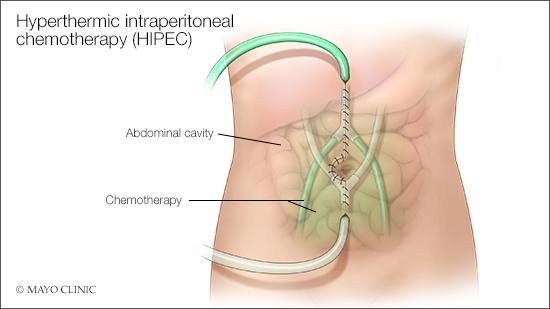Mayo Clinic researchers used a brand new method to chemotherapy to greater than double the standard survival price for sufferers with abdomen most cancers and peritoneal metastasis, which is most cancers that has unfold to the liner of the stomach cavity, in line with a examine revealed within the Annals of Surgical Oncology.
Abdomen most cancers, which can also be referred to as gastric most cancers, is brought on by an uncontrolled development of cells that begins within the abdomen. Most abdomen cancers are discovered when the illness has unfold past the abdomen and a treatment is much less possible.
“We’re seeing a rise in abdomen most cancers in youthful folks, and it tends to be extra superior,” says Travis Grotz, M.D., surgical oncologist. “Sadly, when abdomen most cancers spreads to the peritoneum, systemic remedy is the first therapy, leading to just one yr to dwell on common. Our analysis staff was decided to enhance outcomes for these sufferers to allow them to have extra time with their household and mates.”

Within the examine, the sufferers obtained cytoreductive surgical procedure to take away all seen most cancers tumors within the abdomen and stomach cavity, adopted by hyperthermic intraperitoneal chemotherapy (HIPEC). Throughout HIPEC, the stomach cavity is bathed with sizzling chemotherapy medication, on this case cisplatin and paclitaxel, for 90 minutes to kill any remaining microscopic most cancers cells. Heating the chemotherapy medication and administering them straight into the stomach cavity permits for each the next dosage and larger penetration of the chemotherapy, leading to extra most cancers cells being destroyed than typical therapy, say the researchers.
“The median survival for many stage 4 gastric most cancers sufferers is round 13 months,” says Dr. Grotz, who’s lead creator of the examine. “Through the use of this new mixture of chemotherapy medication throughout hyperthermic intraperitoneal chemotherapy, greater than half (55%) of our sufferers are nonetheless alive three years after surgical procedure.”

The sufferers studied had been ages 46-62 with stage 4 gastric most cancers with peritoneal metastasis. They obtained a mean of seven cycles of chemotherapy previous to present process cytoreductive surgical procedure mixed with hyperthermic intraperitoneal chemotherapy. After the process, the sufferers stayed within the hospital for round six days, with most sufferers having no problems. Of the sufferers who had problems, most had been decrease grade and did not lengthen their hospital keep.
Researchers adopted the sufferers clinically with imaging and tumor markers each three to 4 months for the primary two years and each six months thereafter. The one, two and three-year total survival charges had been 96%, 78% and 55%, respectively.
The analysis staff is trying to enhance these outcomes even additional by performing comparable procedures robotically to require smaller stomach incisions. The objective is to lower the size of hospital stays and complication charges and quicken restoration so sufferers can get again to having fun with their lives. Ultimately, Dr. Grotz hopes to do the process even sooner after analysis to forestall the unfold of abdomen most cancers to the peritoneum.
“Individuals with gastric most cancers are often advised they haven’t any hope and no choices. Once I was a medical pupil, I used to be motivated to wholly perceive the most cancers, how one can deal with it to actually make a significant affect and treatment a few of these sufferers or lengthen their survival or assist alleviate their signs,” says Dr. Grotz. “Though we nonetheless have an extended approach to go, we have made some massive strides and can proceed to make progress to supply hope and therapeutic for our sufferers.”
Overview the examine for a whole checklist of authors, disclosures and funding.
Associated tales:
Mayo Clinic Minute: New chemotherapy method for treating abdomen most cancers
Extra adventures due to superior most cancers care, robotic surgical procedure
Mayo Clinic Q&A podcast: Scorching chemotherapy for late-stage cancers

